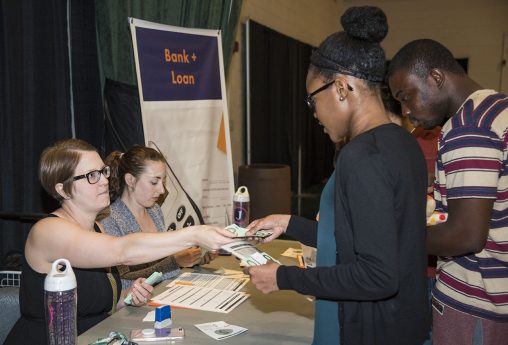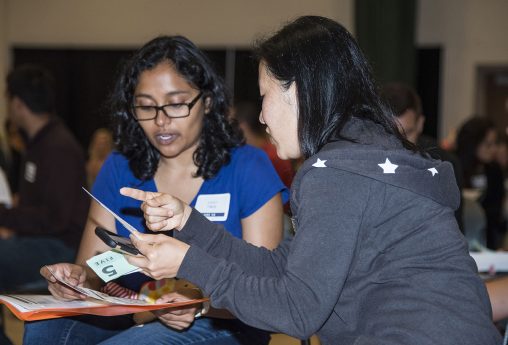
First-year medical students at Wright State Boonshoft School of Medicine gained first-hand knowledge of the challenges low-income individuals face through the Cost of Poverty Experience.
First-year medical students at Wright State University Boonshoft School of Medicine gained first-hand knowledge of the challenges low-income individuals face through the Cost of Poverty Experience (COPE) on July 16, the first day of classes. The class of 2022, which includes 120 first-year medical students, gained a better understanding of the complexities of poverty and the role the broader community plays in interactions with low-income families.
The medical students played roles and had to complete particular tasks such as securing transportation to get to an appointment at a clinic, getting to work on time without a car and deciding whether to pay a utility bill or buy medicine or food.
“COPE was particularly valuable for our first-year medical students. The students learned how physically and mentally exhausting it is to be poor as they tried to determine how to make ends meet, take care of a family, go to work and go to school,” said Sabrina Neeley, Ph.D., associate professor and director of the Population Health Curriculum, who was one of the organizers of the event. “After observing the students participate in the experience and listening to their reflections, we consider this to be a very positive and enlightening experience.”
Neeley and Paul Hershberger, Ph.D., professor and director of the Division of Behavioral Health in the Department of Family Medicine, met with representatives from the CareSource Foundation and ThinkTank, developers of COPE, to plan the event. This was the first COPE event held at a medical school. The CareSource Foundation funded the event. Many organizations and communities nationwide use COPE to work more effectively with low-income families to better understand and address the issues of poverty.
“The CareSource Foundation was so proud to partner with the Wright State University Boonshoft School of Medicine,” said Cathy Ponitz, vice president of CareSource. “Watching these students play out tough scenarios both with smart decisions and compassionate hearts gives us great hope for the future of health care.”

The medical students played roles and had to complete particular tasks such as securing transportation to get to an appointment at a clinic, getting to work on time without a car and deciding whether to pay a utility bill or buy medicine or food.
Hershberger was fascinated to see how quickly the students adopted their roles and experienced the frustrations they faced.
“Comments from the students reflected important insights they gained from the experience,” he said. “A number of students mentioned how important it is for them to remember the experience as they proceed through their medical education.”
Hershberger said it is vital for first-year medical students to become familiar with the wide array of challenges that patients may face. These challenges can have a profound impact on patients’ health and their ability to follow health recommendations.
“Having students play the role of a family member in poverty is a more effective way to illustrate pervasive impact of significant financial stress than simply talking about it,” he said.
First-year medical student Elisabeth Adkins played a 35-year-old man who lived at home with his aunt and uncle after coming back from the military. The family was unable to pay the full amount for their grocery bill.
“This experience was enlightening,” Adkins said. “It helped me understand the struggles that my future patients face each day and how these things can have an overwhelming effect on their health.”

 Gov. DeWine reappoints Board Treasurer Beth Ferris and names student Ella Vaught to Wright State Board of Trustees
Gov. DeWine reappoints Board Treasurer Beth Ferris and names student Ella Vaught to Wright State Board of Trustees  Joe Gruenberg’s 40-Year support for Wright State celebrated with Honorary Alumnus Award
Joe Gruenberg’s 40-Year support for Wright State celebrated with Honorary Alumnus Award  Wright State’s elementary education program earns A+ rating for math teacher training
Wright State’s elementary education program earns A+ rating for math teacher training  Wright State’s Calamityville hosts its largest joint medical training operation
Wright State’s Calamityville hosts its largest joint medical training operation  Wright State University launches Strategic Plan 2030 to advance student success, enhance role as regional economic driver
Wright State University launches Strategic Plan 2030 to advance student success, enhance role as regional economic driver 